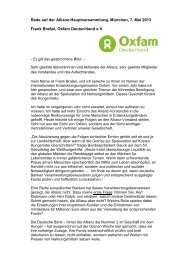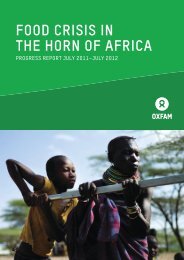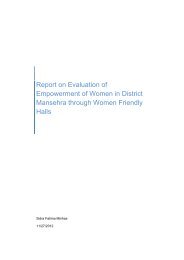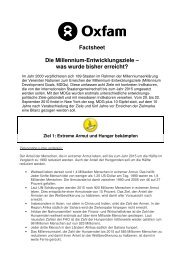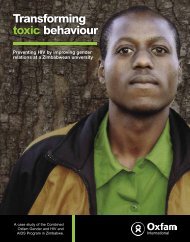No Time to Lose - Oxfam
No Time to Lose - Oxfam
No Time to Lose - Oxfam
You also want an ePaper? Increase the reach of your titles
YUMPU automatically turns print PDFs into web optimized ePapers that Google loves.
Funding for the Afghan Security Forces Fund is appropriated annually<br />
under the Defense Appropriations Act, and thus, such funding<br />
must not be utilised <strong>to</strong> train ANSF units where there is credible evidence<br />
that the unit has committed gross violations of human rights,<br />
unless necessary corrective steps have been taken.<br />
In fulfilling their obligations under the Leahy provisions, State Department<br />
personnel must ensure that military and law enforcement<br />
personnel are carefully vetted prior <strong>to</strong> inclusion in Department of Defense-funded<br />
training programs, and that full consideration is given<br />
<strong>to</strong> all available information relating <strong>to</strong> human rights violations. Vetting<br />
procedures must ‘ascertain that no one against whom there are<br />
credible allegations of gross violations of human rights is currently<br />
assigned <strong>to</strong> the units in question’. Where such allegations exist, ‘corrective<br />
steps’ may involve adjusting the planned activity, or removing<br />
some of the participants. 90<br />
In light of the above discussion regarding the criminal his<strong>to</strong>ries of<br />
some of those recruited in<strong>to</strong> the ANP (particularly the ALP), and<br />
compounded by the fact that vetting, while improving, has in many<br />
instances been minimal (one ISAF official reflected that in 2008, community<br />
members were ‘basically rounded up off the street, <strong>to</strong>ld they<br />
were doing cash-for-work, and then they’d turn up at the training and<br />
<strong>to</strong>ld they were police’ 91 ), it is difficult <strong>to</strong> see how the provision by the<br />
US of training <strong>to</strong> at least some of these units could not have been in<br />
breach of the Defense Appropriations Acts.<br />
While no other states have restrictions on the provision of security assistance<br />
equal <strong>to</strong> those of the US, member states of the EU are bound<br />
by the Council’s Common Position on the exportation of military<br />
technology and equipment. The Common Position requires member<br />
states <strong>to</strong> ‘deny an export licence if there is a clear risk that the military<br />
technology or equipment <strong>to</strong> be exported might be used for internal<br />
repression ... [or] in the commission of serious violations of international<br />
humanitarian law.’ 92<br />
In assessing whether there is a clear risk that a proposed export might<br />
be used for internal repression, member states are advised <strong>to</strong> consider<br />
the current and past human rights record of the proposed ‘end-user’,<br />
whether law enforcement agencies are trained in human rights,<br />
whether there is impunity for human rights violations, and whether<br />
there are independent moni<strong>to</strong>ring bodies and national institutions for<br />
the promotion or protection of human rights. 93 In assessing whether<br />
there is a risk that equipment/technology might be used <strong>to</strong> commit<br />
serious violations of international humanitarian law, questions for<br />
consideration include: whether the state has taken action <strong>to</strong> prevent<br />
and investigate violations of international humanitarian law; whether<br />
the state requires its military commanders <strong>to</strong> take action against those<br />
20




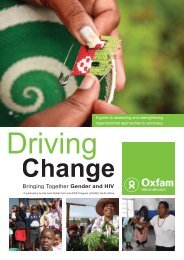

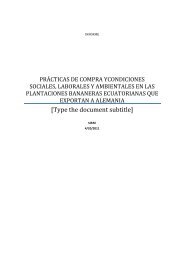
![Download: Faltposter EU-Handelspolitik [PDF 2,17MB] - Germanwatch](https://img.yumpu.com/25095854/1/190x161/download-faltposter-eu-handelspolitik-pdf-217mb-germanwatch.jpg?quality=85)
